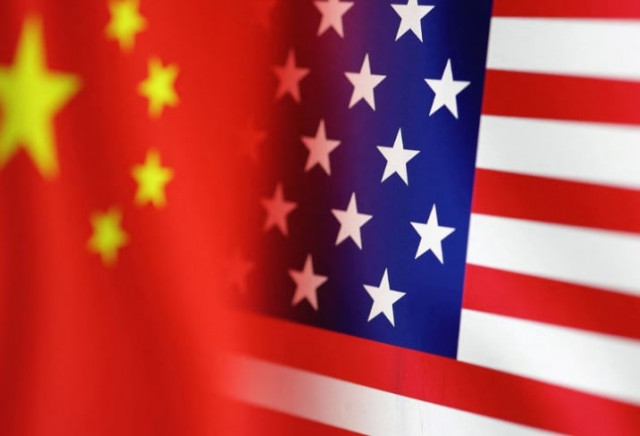US-China trade spat: global economy may suffer
Trade war seems to be intensifying ahead of US President-elect Trump's inauguration

The two biggest economies of the world – the US and China – should resolve their disputes amicably so that the global economy may not suffer and developing economies are not forced to bear the burden of trade-cum-tech war.
Any protectionist approach from the US will not benefit the world. The US has to blame itself for the tit-for-tat actions taken by China recently as the trade war seems to be heating up ahead of US President-elect Donald Trump's inauguration next month.
It is quite interesting that Trump has invited Chinese President Xi Jinping to attend his inauguration in January and hopefully both will have a high-level engagement on the sidelines of the occasion.
So far, Trump has adopted a hawkish stance against China and has promised to impose even heavier sanctions as well as a whopping 60% tariff on all Chinese goods.
In response, Beijing has banned exports of some goods to the US including important and rare minerals like gallium, germanium and antimony, which have widespread military applications, escalating trade tensions after Washington's crackdown on China's chip sector, according to Reuters. In this regard, China's overall October shipments of antimony products plunged 97% from September.
China accounted last year for 48% of globally mined antimony, which is used in ammunition, infrared missiles, nuclear weapons and night-vision goggles as well as in batteries and photovoltaic equipment.
This year, China has accounted for 59.2% of refined germanium output and 98.8% of refined gallium production, according to consultancy Project Blue.
No doubt, the US is anticipating losses of billions of dollars after China banned exports of the three rare minerals. Earlier, Trump in his first presidency, also initiated a trade war by slapping tariffs on Chinese imports.
It wasn't limited to trade, it also spread to technology and this time around, it will happen again, but China seems more poised to face any untoward situation, if tensions escalate further.
Eminent analyst and Pakistan-China Institute Chairman Mushahid Hussain Sayed said this time around China is more ready and prepared for the trade war. It has retaliated against the US tariffs.
The New York Times, in its story, said General Motors (GM), which is the symbol of American industrial might, has suffered a loss of $5 billion as its cars cannot compete with Chinese automakers, which is a revolutionary change because of the fast-paced development of high-quality Chinese vehicles.
Technology is the real issue in competition between the US and China because Washington has always remained on top in hi-tech but now it seems China has come either at par or has overtaken the US.
Quoting a couple of studies done in the West, he mentioned that a few months ago, The Economist ran a cover story titled China is a scientific superpower.
The Economist said that the old science order dominated by the US, Japan and Europe has come to an end and out of the top 10 science and technology universities, six are in China.
It added that China is leading the world, accounting for 40% of the original empirical research papers, which is really a major change.
"And then I saw another study last year, issued by Harvard University Professor Graham Elison, called a great tech rivalry – China versus the US. This 52-page study says China is overtaking the US in hi-tech manufacturing in terms of 5G, AI, cloud computing, robotics and the like. So, there is a qualitative change in the situation," he said.
Last year, Huawei became a victim of the US sanctions that ruled out a new Mate 60 Pro cellphone, which had a special technology that shocked the Americans as to how the Chinese got access to that.
China is not sitting around; it is working very hard quietly behind the scenes and outclassing the US technologies.
According to analyst and researcher Professor Engineer Zamir Ahmed Awan, the US-led efforts to contain China reflect an aggressive approach driven by the refusal to accept a multipolar world. By employing economic warfare, technological barriers and strategic encirclement, the West aims to preserve its global dominance at the expense of China's legitimate aspirations.
The Chinese narrative underscores that such actions not only harm bilateral relations but also undermine global stability and progress. As the rivalry intensifies, the need for mutual respect and cooperation becomes paramount to avoid a new era of confrontation.
Economic analyst Usama Rashid said there is a need for realisation among the world powers that their actions will set the direction for the rest of the world. "The bigger the economy and the more powerful the country you are, the larger the impact of your actions will be." Therefore, the realisation of this responsibility is absolutely important.
Moving forward, the next important step is the need for ethics and rationality in decision-making and avoiding the mindset that it is the right of one nation to dominate the globe.
Every nation has the right to protect its economy and make it grow. At the same time, countries have the right to safeguard their strategic interests, which are vital for national security.
On top of that, developing countries like Pakistan should play the role of a bridge between the two superpowers.
The writer is a staff correspondent



















COMMENTS
Comments are moderated and generally will be posted if they are on-topic and not abusive.
For more information, please see our Comments FAQ